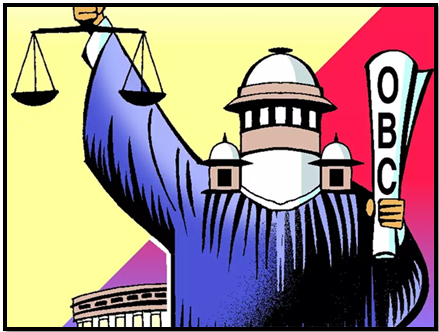A MATTER OF BACKWARDNESS CALCUTTA HIGH COURT’S JUDGMENT ON OBC RESERVATION FOR MUSLIM
SYLLABUS:
- GS 2: Appointment to various Constitutional posts, powers, functions and responsibilities of various Constitutional Bodies.
Focus:
- Calcutta High Court’s judgment on OBC reservation for Muslim backward classes fails to acknowledge that the quota is aimed at substantive equality
Source: The leaflet
Introduction
- The Indian Constitution promises social justice and permits special provisions for the underprivileged to achieve substantive equality.
- Reservation policies have been largely driven by electoral compulsions rather than purely constitutional promises.
- The “appeasement” tag is often used in the context of Muslim backward castes or Pasmanda Muslims, unlike for other caste-based reservations.
- Inclusion of various castes in the Backward list or their transfer to the Scheduled Caste (SC) list has been a contentious issue.
- Announcements of inclusion in the SC list by chief ministers like Akhilesh Yadav and Yogi Adityanath illustrate the political dimensions of such decisions.
Judicial Response to Reservation Policies
- The judiciary has generally not been supportive of reservation policies.
- Key judicial decisions include the exclusion of the “creamy layer” (Indra Sawhney, 1992) and the 50 percent upper limit on reservations (MR Balaji, 1963).
- Courts have emphasized “efficiency” and shown more sympathy towards general candidates.
- In cases of Muslim Backward Classes, courts have applied strict scrutiny and microscopic evaluation of policies.
- The 211-page judgment by justices Iapabrata Chakraborty and Rajasekhar Mantha of the Calcutta High Court struck down the inclusion of some Muslim BCs.
Grounds for the High Court’s Decision
- The inclusion of these castes was made by executive orders.
- The West Bengal Backward Class Commission was not consulted on sub-categorization.
- The recommendations of the Commission were not based on an in-depth empirical survey of the entire population.
- The “inadequacy of representation” in state services of these castes was not fully examined.
- The West Bengal Commission for the Backward Classes Act, 1993 made recommendations mandatory, but the 2012 Act diluted this requirement.
Critique of the High Court’s Judgment
- The High Court’s scrutiny of the BC Commission’s minutes and time taken for disposal of applications was beyond usual judicial review.
- The court overlooked the Supreme Court’s stance in Indra Sawhney that reservation can be provided by executive order.
- The rejection of the Sachar Committee’s findings based on the age of data was criticized.
- The High Court’s criticism of the BC Commission’s survey methodology was surprising given the limited scope of the Mandal Commission’s survey.
- The court should have applied similar scrutiny to the recommendations regarding non-Muslim castes.
Controversial Aspects of the Judgment
- Many Muslim BC castes had been previously included in the BC category by the Mandal Commission and the central government.
- The judgment acknowledged but did not appreciate the inclusion of occupational Hindu castes within the SCs as proof of backwardness.
- The court questioned the timing and motive of the conversion of Muslim castes, which is irrelevant.
- The judgment overlooked that Christian converts from SCs have been recognized as Backward in West Bengal.
- The judgment’s differentiation between SC and BC reservations and its refusal to accept the argument of conversion from Scheduled Castes adds to the controversy.
Conclusion
- The judgment raises questions on the scrutiny applied to reservations for Muslim BCs.
- There is a need for consistent application of scrutiny across all castes and religions.
- The backwardness of Muslim BCs should be the basis for reservations, not their religion.
- The writer emphasizes that backward Muslims should receive the same privileges as their non-Muslim counterparts.
- The article reflects the personal views of Faizan Mustafa, Vice-Chancellor of Chanakya National Law University, Patna.
| National Commission for Backward Classes (NCBC)
Establishment and Constitutional Status:
Composition:
Functions:
Powers:
|
Source:The Hindu
Mains Practice Question:
Examine the historical and constitutional basis for reservations in India, focusing on the specific challenges faced by Muslim backward classes. How do political and judicial responses to these challenges reflect broader issues of social justice and equality in the country? (250 words)
Associated Articles:
https://universalinstitutions.com/clarification-on-de-reservation-policy/




